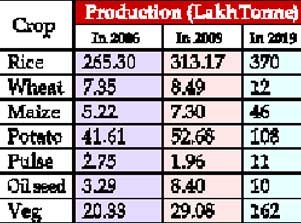Bangladesh archetype of food security

Despite various calamities like flood, drought, salinity and hostile nature coupled with depleting agricultural land and climate change, Bangladesh is now a global example of food security.
In only one decade, the country witnessed massive food production and it has become a food exporting country.
It is now the third largest grower of vegetables and the fourth largest producer of rice and fish in the world, according to local and international experts.

Bangladesh is the most successful country in South Asia in achieving agriculture and food security to meet the United Nations Millennium Development Goals (MDGs). It has also made a significant progress in nutrition security.
According to a report titled 'Global Hunger Index' published by the International Food Policy Research Institute (IFPRI), there was a severe food crisis in Bangladesh after the catastrophic cyclone in 1970.
Bangladesh's agricultural production was disrupted during the nine-month War of Independence in 1971. From that situation, Bangladesh has turned around. Most of the grain prouction in the country has multiplied several times.
In order to continue the development of the sector, the government is continuing successful interventions, such as agricultural subsidies, other agricultural input incentives and support cards including those for fertilisers and seeds, support for agricultural rehabilitation, and agriculture credit on easy terms, according to the agriculture ministry.
Agriculture Minister Dr. Muhammad Abdur Razzaque said Prime Minister Sheikh Hasina directed that not even an inch of arable land should remain uncultivated with utmost importance to agriculture in tackling the potential food crisis. As a result of these initiatives, Bangladesh has continued the trend of food production despite aggression of the rogue virus corona and natural disasters.
‘The Ministry of Agriculture is working relentlessly to ensure food security. ‘Aus’ and ‘Aman’ paddy production targets have been increased. In the current fiscal year, ‘Aus’ has been planted on 13.298 lakh hectares and the production has been about 34.517 lakh MTs.
As a result, ‘Aus’ cultivation has increased by about 2 lakh hectares and production by 4 lakh MT as compared to that of the last year. Besides, the target for planting ‘Aman’ paddy was 59 lakh hectares this year. Repeated floods have damaged seedlings and crops in the field,’ he said.
He also said ‘Boro’ paddy seeds will be subsidised at taka 10 per kg to increase the production in the coming season.
The Agriculture Minister said nutrition gardens have been set up in 1 lakh 40 thousand 387 households in 4398 unions of the country worth Tk 37.36 crore to ensure family nutrition security by bringing every inch of land under cultivation. Besides, 100 new family gardens are being set up in each union to mark the ‘Mujib Barsho’.
According to the Ministry of Agriculture, the contribution of agriculture sector to the gross domestic product (GDP) is 13.6 percent.
In order to build a country free from hunger and poverty as dreamt by Father of the Nation Bangabandhu Sheikh Mujibur Rahman, the present government has taken various initiatives by giving utmost importance to the agricultural sector and considering the development of agriculture and the welfare of the farmers.
Now, subsistence agriculture has been transformed into commercial agriculture due to the timely steps taken by Prime Minister Sheikh Hasina.
Following the increase in productivity, the target of production of granular food grains has exceeded around 435 lakh metric tonnes. The country has a surplus of rice now.
Rice production increased in Bangladesh during the last decade. In 2009, rice production was 313 lakh metric tonnes, which has now increased to around 370 lakh metric tonnes.
This year also a large amount of paddy has been produced. Bangladesh is going to be the third largest country in rice production due to continuous increase in production, the US Department of Agriculture (USDA) made this forecast on May 14.
Maize production was 7.30 lakh MT, which has increased to 46 lakh MTs. The vegetable revolution has taken place in the country in the last one era. At present 60 types and 200 varieties of vegetables are being produced.
There are 1 crore 62 lakh farming families in the country. Almost all of these farming families cultivate vegetables. In 2009-10, 1 crore 25 lakh tonnes of vegetables was produced, which in 2018-19 was 1 crore 82 lakh tonnes.
Bangladesh is seventh in the world in potato production. This year potato production has been 1 crore 9 lakh tonnes.
Bangladesh is the seventh in the world in mango production and eighth in guava. Mango production has increased to about 24 lakh tonnes.
In order to get a fair price for the farmers and make safe vegetables and fruits easily available, a farmers market has been launched in Sher-e-Bangla Nagar in the capital, where farmers are marketing their produce directly.
This system will be gradually expanded to district and upazila towns, according to the ministry of Agriculture.
In 2013, for the first time in the world, zinc-rich rice varieties were invented by agricultural researchers in Bangladesh.
The FAO predicts Bangladesh will be the first of the four countries in the world to achieve huge success in fish farming by 2022, followed by Thailand, India and China. As a result of various initiatives including conservation of Jatka, the production of the country's most popular fish Hilsa has increased by 52,000 tonnes to 3.5 lakh tonnes.
The per capita consumption of fish in the country has increased by 100 per cent in the last ten years as the price of fish is within the reach of the average consumers.
Bangladesh ranks fourth in the world in goat rearing and fifth in mutton production. Bangladesh's Black Bengal breed goat has been recognized as the best breed in the world.
The present government has given utmost importance to the agricultural sector in order to build a hunger and poverty free country as dreamt by the Father of the Nation Bangabandhu Sheikh Mujibur Rahman.



